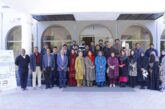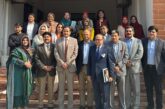
Media Tracker lists the challenges and achievements of the journalists and media organisations worldwide. Here’s a list of journalism at risk stories in the recent month. We would like to thank international media protection organisation and news outlets for their content.
- In Turkey, Cumhuriyet Editor-in-Chief Murat Sabuncu and investigative journalist Ahmet Şık have been released on bail at the sixth hearing of the trial the court. The court however did not show such magnanimity towards the CEO of the newspaper, saying, “ The captain is last to leave the ship.” Despite international pressure, Turkish government didn’t budge and the imprisoned journalist faced about 450 days in detention. This move will not help Turkey’s image on the issue of free expression as its been strongly criticized for severe shortcomings in the rule of law. Media rights organisations blame Turkish judiciary for not being able to guarantee journalists a fair trial.”
(IPI)
- Recent development in the autocratic Kyrgyzstan threatens to send the country’s right to free expression down a repressive path by punishing journalists using legally ambiguous grounds. According to the news defamation lawsuits are being used to levy disproportionate fines, travel bans and other harsh penalties against journalists and media outlets accused of insulting the President under the ‘Law On Guarantees for Activity of the President of the Kyrgyz Republic’. As obligated by the Law, the General Prosecutor has pursued several lawsuits against individual journalists and media entities for discrediting the “honour and reputation” of the President or former president(s).
(IFEX)
- International Federation of Journalists has lodged an urgent appeal with United Nations to shield BBC Persian service journalists in Iran. According to a report BBC Persian Service journalists in London and their families in Iran have been systematically targeted since the 2009 launch of BBC’s satellite television service. Last year the harassment was escalated, when BBC Persian Service journalists’ work was alleged as a crime against Iran’s national security. Consequently the Iranian authorities commenced a criminal investigation and passed an asset-freezing injunction citing 152 named individuals, comprising mainly of current and former BBC Persian staff – effectively preventing journalists and their families from buying or selling their homes and other property in Iran; arbitrary arrest and detention of family members in Iran; confiscation of passports and travel bans preventing people leaving Iran; ongoing surveillance of journalists and their families; and the spread of fake and defamatory news targeting individuals, especially women journalists.
(IFJ)
- Tweet…if you dare: How counter-terrorism laws restrict freedom of expression in Spain a report on free expression reveals Spanish government’s heavy-handed tactics affecting scores of ordinary social media users as well as musicians, journalists and even puppeteers have been prosecuted on grounds of national security. These measures are being used to deter people to exercise their free expression, offer alternative views, or even make controversial jokes. Under Article 578 of the Spanish Criminal Code those deemed to have “glorified terrorism” or “humiliated the victims of terrorism or their relatives” – no matter how vague these terms are – face fines, bans from jobs in the public sector and even prison sentences. The number of people charged under this Article increased from three in 2011 to 39 in 2017 and nearly 70 people were convicted in the last two years alone.
Since 2014, four coordinated police operations – dubbed the “Spider Operations” – have led to scores of people arrested for posting messages on social media platforms, in particular Twitter and Facebook.
(Amnesty International)




